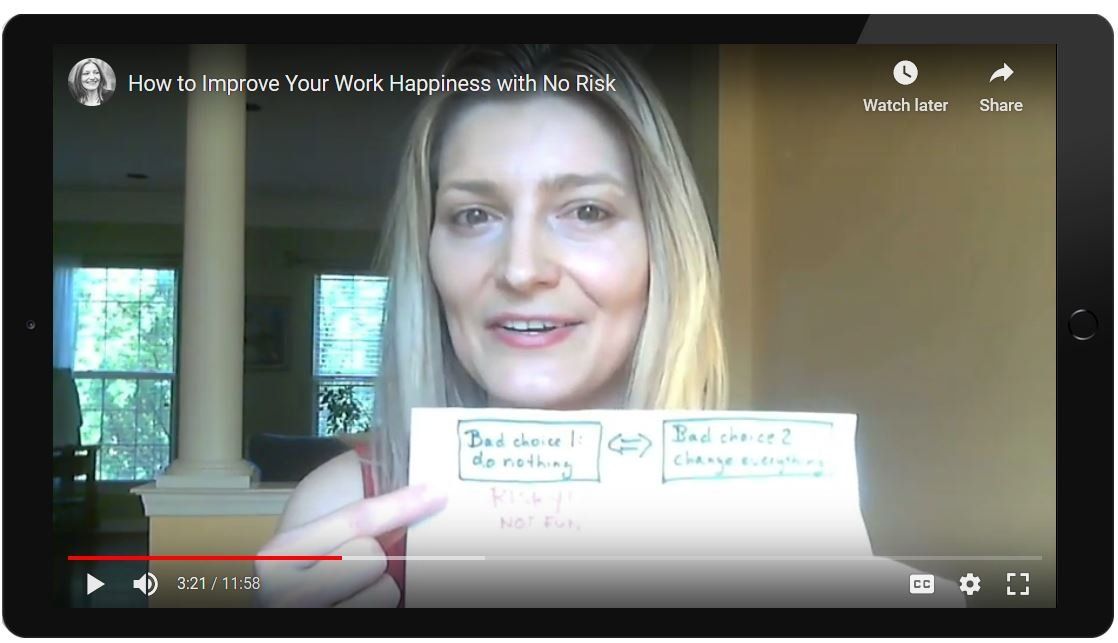Should You Stop Idealizing the Things You Want?
People often find themselves idealizing what they most want, whether it's their soulmate, finding their passion, or a spiritual awakening. By that I mean that they attribute overly positive qualities to something.
Today, I’d like to encourage you to stop turning what you want into a mythical thing.
Let's assuming you're looking to live your passion. Do you think all would be well, better than well, just amazing, if you just accomplished that?
Well, that would be understandable. When we want something we don’t (yet) have, it’s easy to fall into…
The trap of idealization
Often, people get so caught up in their search for their “passion,” or “purpose” (check out my article for the difference between passion and purpose ) that they put it on a pedestal.
The search for one’s passion then becomes as emotionally charged as a desperate romance involving The One.
And we all know how well that works… 💔
I’m looking at you, Romeo and Juliet!
So, stop idealizing passion!
Passion is not a unicorn. (No offense to unicorns intended.)
It’s not a real-life fairy tale.
And it’s not the pot of gold at the end of the rainbow. 🌈
So, stop idealizing passion. Actually, stop idealizing everything if you can.
While your life will likely be a lot more fulfilled if you live your passion, or if you are with your soulmate, you will still be you (which is a good thing!).
Also, you won’t magically find yourself in a land of milk and honey (or almond milk and agave syrup, for my fellow vegans).
Once you stop over-idealizing your passion (or your soulmate), you have a much better chance of getting what you want.
One reason we idealize anything is because of the…
Fear of averageness
In many Western countries these days, we’re afraid of being average, of being ordinary, of being normal.
But, our normal is actually pretty darn mindblowing.
For instance, take the planet you’re on right now (assuming you’re on 🌍). It’s currently racing around the sun at an average of 110,000 kilometers (or 67,000 miles)… per hour. 🕐
Or, take yourself.
As Bill Bryson put it in his book A Short History of Nearly Everything:
“Consider the fact that for 3.8 billion years, a period of time older than the Earth’s mountains and rivers and oceans, every one of your forebears on both sides has been attractive enough to find a mate, healthy enough to reproduce, and sufficiently blessed by fate and circumstance to live long enough to do so.”
Umm, maybe “average” is so special that it doesn’t make any sense to put anything on a pedestal?
After all, what could be more miraculous that we’re 📍 (here) and 🕐 (now)?
Making Passion Average Again
So, maybe it’s time to take passion off the pedestal. Maybe it’s time to make it average again.
As Dan Bailey Photo so pointedly put it when talking about creativity:
“Don’t put creativity on a pedestal , take it down and stick it in your pocket and don’t be afraid to wrinkle it up and get it dirty. Creativity is not something to be worshiped and revered and handled with clean, white gloves, it’s something to use with your bare, calloused hands.”
I think the same applies to passion. What good is passion on a pedestal, rather than in real life?
So, how do we take passion of the pedestal?
Well, as Nick Maccarone so accurately diagnosed: “We’re led to believe passion must precede the pursuit.” But, as he remarks, passion is “simply a byproduct of first putting in the work.”
This is similar to the advice Max Nussenbaum gives: “the only way to figure out what you’re passionate about is to try something and see what happens. In most industries, passion is an acquired taste.”
In my German culture, we have a common saying that relates to something similar: “appetite comes with eating.”
It basically means that your desire to do something increases as the activity proceeds. For instance, you might not have a desire to write when you first sit down, but feel motivated to continue once you really get into it.
So, maybe it’s time to start to eat, metaphorically speaking?
With all that being said, let’s move on to…
Taking action
To put this into practice, go through the following process.
(If you want to get the most out of this or if you're afraid of getting
stuck, get the "Taking Action Worksheets" and begin by filling those
out.)
- Write down at least 3 things you love to do
These should be active things (so, for instance, writing instead of reading, making music instead of listening to music). For instance: "I love to write fiction. I love to make soups. I love to play the guitar (or at least I used to so I assume I still would if I started again).
- Get
your calendar
It doesn't matter if your calendar is in a digital or a physical format.
- Schedule 30 minutes of uninterrupted time in your calendar
Once you find an open 30-minute slot at a convenient time, block it off.
- Pick the thing from your list above that you're worst at
For instance: "Out of that list, I'm probably worst at playing the guitar since I haven't done it in forever."
- Spend your time doing this thing
While you're engaged with the passion that you're worst at, aim to be okay with mediocrity or even with sucking at it. Simply have fun doing what you love to do, regardless of your level of skill.
The idea💡
To connect more deeply with your passion and purpose, stop idealizing it.
Make it ordinary.
And just do the work.
As the Zen quote reminds us,
“Before enlightenment, chop wood, carry water. After enlightenment, chop wood, carry water.”
Or, as we could put it:
“Before finding your purpose, do the work and help others. After finding your purpose, do the work and help others.”
Yes, it sounds less catchy but it’s just as true.






